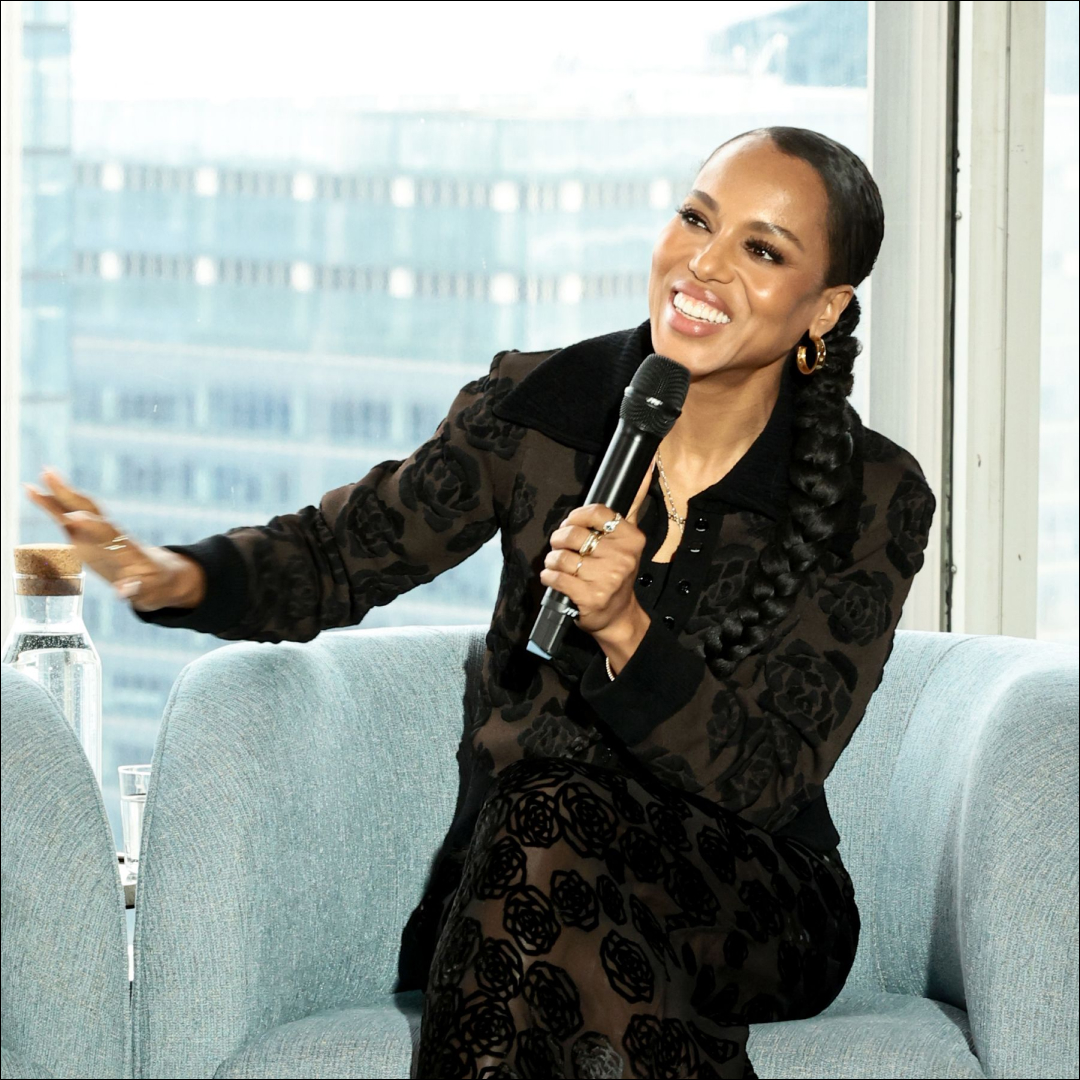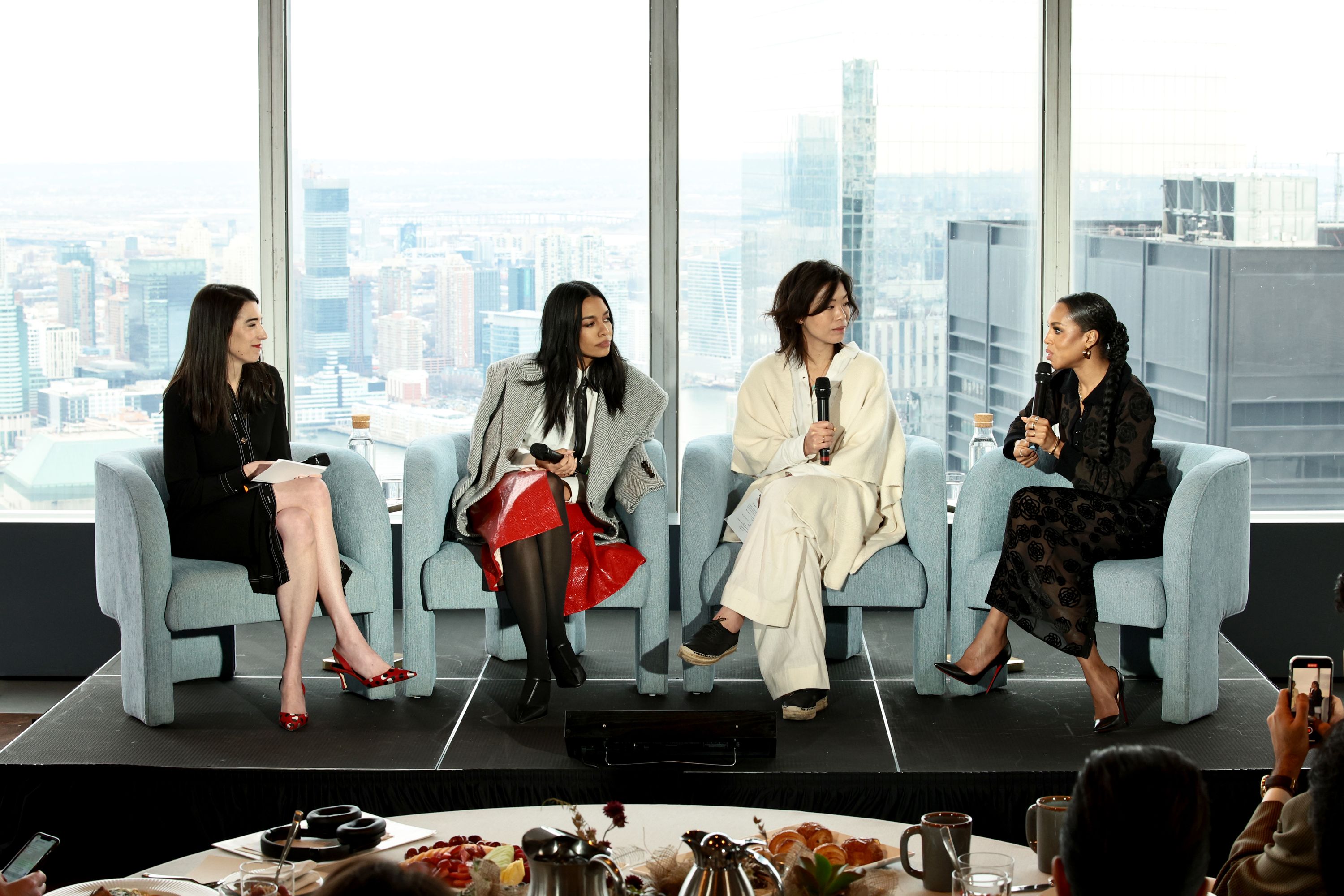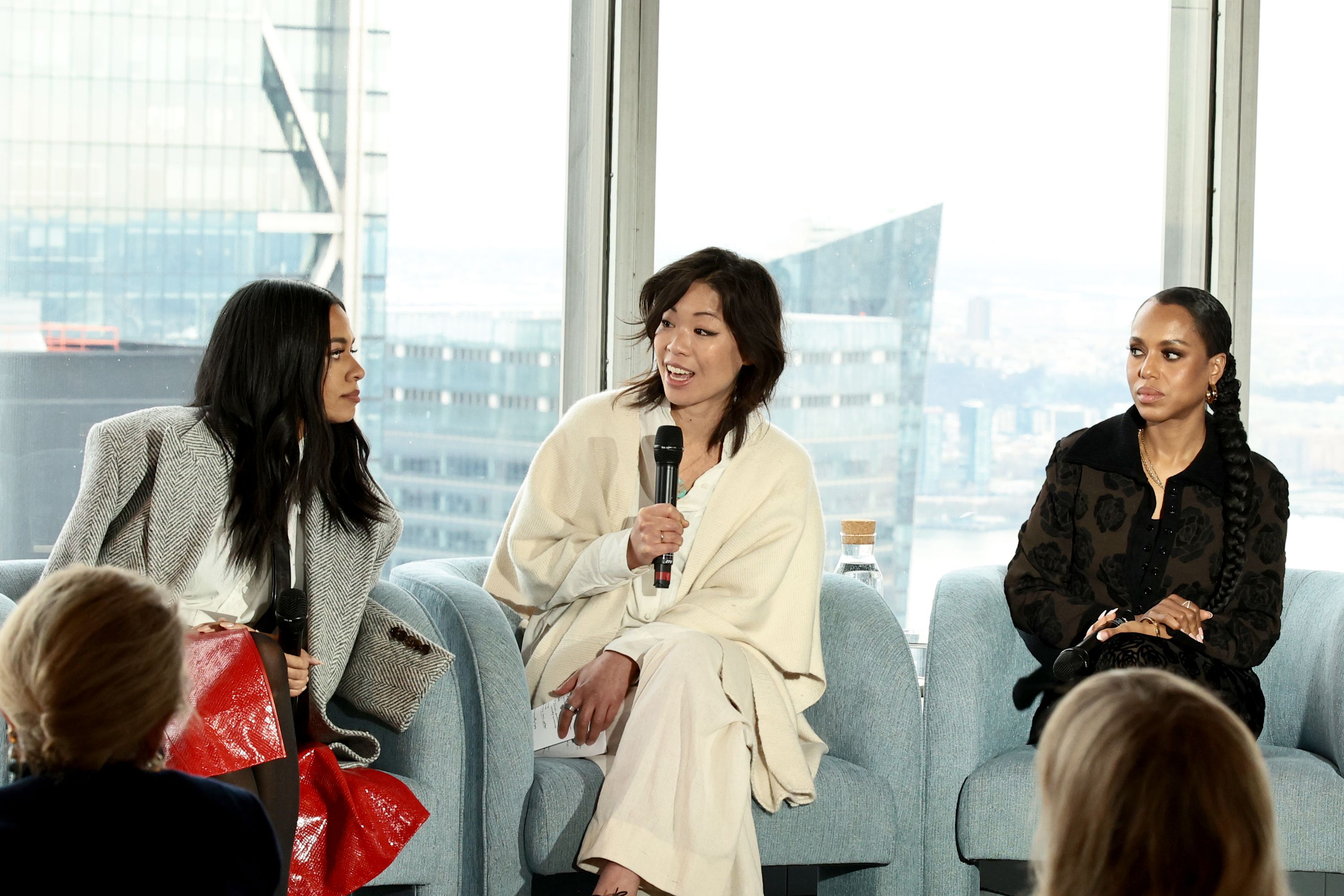
Rehabilitating our earth and building a more eco- and ethically-conscious future is a daunting feat. However, it’s not a journey you have to—or should—embark on alone. This was the takeaway from “The Power of Community” panel during the second event for Fashion our Future, an initiative between Marie Claire and Kering that brings together professionals, celebrities, and activists to discuss the strides needed to forge a more sustainable fashion industry.
While Marie Claire’s Editor-in-Chief Sally Holmes moderated, the three panelists—Kerry Washington, actress and founder of the production company Simpson Street; Aurora James, founder and creative director of Brother Vellies, The Fifteen Percent Pledge, and author of Wildflower: A Memoir; and Angel Chang, the womenswear designer behind her eponymous brand—spoke on how rectifying the fashion industry’s past wrongs must be a collaborative effort, and how equity and inclusion are vital in creating a brighter, better, and greener future.

"Anytime you want to try to effect monumental change, you need all ships to be aligned in the direction of the North Star," said James to kick off the conversation. The multi-hyphenate stressed the importance of sustainable fashion being an all-hands-on-deck venture that requires input and actionable change from all players involved, from industry executives to influential celebrities to everyday consumers. "We can design all the things in the world, but unless people like Kerry [Washington] also help amplify it and explain to their community members why it's important, it won't get the visibility it needs. So much of sustainability right now still needs to be a conversation because we're all still figuring it out, and we need to engage with consumers to help them figure it out," she added.
As for Chang, she stressed the importance of accessible education and understanding the intention behind clothing production and consumerism. "Eighty percent of a product's environmental impact is determined at the design stage. So designers need to be educated on the decisions they're making when creating products, and we need management that is educated about these materials and producing better products. If we are to create these climate and environmental solutions, it's really about changing our mindset," said the designer. She urged her fellow designers to think about "why they're creating products" and for consumers to reflect on "why they're shopping," as consciousness is a foundational element in building a more sustainable fashion industry.

Washington agreed with James and Chang's message of top-down collaboration, adding that the process must be open and ongoing, even to the point of repetition. "Real change happens when the message is delivered at multiple stages," said the actress. While walking downtown and reading billboards, scrolling on social media, or reading about how your favorite celebrity wore a vintage archival gown to the latest red carpet—"people need to get the messaging in multiple places to understand that [sustainable fashion] is not a flashbulb moment. It is not a trend. This has to be how we right the ship to maintain our planet's health."
Furthermore, the UnPrisoned star emphasized how crucial it is for the fashion industry's future to be equitable and inclusive, an open door for anyone who wishes to enter. "As a woman of color and fundamentally being, in my heart, a kid from the Bronx, I want people where I'm from to be able to have what I have. It shouldn't be that I'm the exception in my neighborhood; We should all be able to have access to beautiful things."
Washington referenced her partnership with the ethical and sustainable jewelry brand Aurate. "Across the board, there is a give-back component to [Aurate,] and there's a real commitment to figuring out how to provide luxury jewelry in ways that are democratic, accessible, and sustainable," she said. "Not that I think that a gold ring is the solution to our world's problems, but creating and supporting businesses that believe in doing right by the planet, doing right by the communities they serve, and having ethical practices across the board—that believe that we all matter and deserve the best version of our lives—is so important."

James and Chang emphatically agreed with Washington while emphasizing that equity and representation must extend to laborers, too. “What's really difficult for me is to hear brands talk about feminism when you know that women are not being treated properly in their factories in Bangladesh," said James. "You can have a woman of color in your ad campaign, but if you are mistreating women of color in your factory or dumping chemicals in a way that's not helpful to their communities, then really—what are you doing?”
Chang added her hands-on experience relating to the topic, too: “I work with Indigenous artisans in rural China, and it's mostly women who have this traditional craftsmanship that they continue to practice. And when you give women jobs, the first thing they do is give [resources] to their families and send their kids to school. So it's not just representation in terms of how we portray who our garment workers are, but also how it impacts their lives in ways you don't see in their villages.”
Looking ahead to fashion's future, all three women share the same viewpoint: They’re hopeful. “I am so optimistic,” said James. “I think sometimes climate change feels completely insurmountable and a lot of people kind of freeze under that pressure, but knowing that there are very real solutions being innovated right now to help us mitigate this is very major.” For Washington, she emphasized the value of leaning on each other and turning to your peers for inspiration. “Just having this space and to be in community with [Chang and James] is incredibly optimistic because we need to be having these conversations and providing each other with these reminders and insights,” the actor added.
And not only are the three changemakers confident that fashion is on the correct path but they're assured that women will be instrumental in arriving at that more sustainable future. "Historically, nature has not been valued because it has been linked with the feminine. I mean, we call nature mother nature," said Chang. She noted how difficult it is for sustainable fashion brands to acquire funding because "many of them are women-led" and "only two percent of venture capital funds go to women [because] most of the investors who have money are men and invest in male-dominated businesses."
Nevertheless, noted James, it’s women doing the bulk of the work in the sustainable sector. “In general, women, especially women of color—who, first of all, are the most adversely impacted [by climate change]— are more thoughtful about the environment. And women who are interested in [the sustainable fashion] space and choose to take on this work are especially driven and motivated,” said the fashion mogul. “I think, too, that, as women, we're a lot more empathetic, open to changing our minds, to thinking differently and looking holistically at something. [We] are more open to asking questions and being told that they are wrong and that being okay.”







